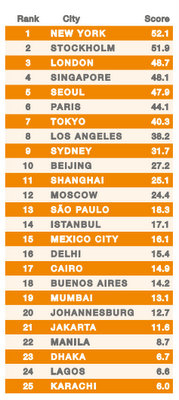S'pore top Asian city for ICT environment for biz

SINGAPORE--Singapore is the top Asian city in Ericsson's Networked Society City Index which focused on how ICT maturity correlates with business bottomlines.
Commenting on the company's latest City Index report, Patrik Regardh, head of strategic marketing at Ericsson, in an interview with ZDNet said New York, Stockholm and London were ranked in the top 3 out of 25 cities but Singapore trailed "very closely" behind.

Asked if city states have an advantage over other cities, Regardh said that was a possibility as the government is able to focus on ICT development in one area. In contrast, the government in bigger countries has many different cities to focus on.
Regardh explained the cities in the report were selected based on the list of 25 biggest cities in the world defined by the United Nations. Sweden and Singapore were added to the list because they were "cutting edge" in ICT adoption, and cities where data on ICT adoption was more difficult to find were removed.
The study used 28 indicators to measure the ranks of the cities. The indicators were divided into two dimensions namely the city's ICT maturity and the bottomline benefits from ICT investments in the social, economic and environmental level.
Seoul and Tokyo were ranked fifth and seventh. Regardh noted that ICT play a "prominent" part of these East Asian cities' development.
The rest of the Asian countries in the list were Chinese cities Beijing and Shanghai respectively in the ninth and tenth position. South Asian cities Delhi, Mumbai, Dhaka and Karachi were at 16th, 19th, 23 and 25th position while Southeast Asian cities Jakarta and Manila were at 21st and 22th.
Regardh said the ranking was not to "point fingers" at lower-performing cities but to act as a guide on how each city was performing and for them to identify which higher ranked cities they could learn from.
Top performing cities see ICT as growth enabler
Asked if the lower-performing cities were lagging behind because they were not able to afford the ICT facilities adopted by the mature cities, the executive said that it was a "complex" matter and not an "either-or" situation.
He did note top performing cities had ICT as a core part of their strategy and vision which was not as prevalent for those in the lower ranks. He stressed ICT has the potential to stimulate economy and improve the performance of the city.
Regardh noted that in lower-performing cities, it was usually the individual who leads the adoption of ICT, which then drives change from government agencies and corporations.
However, corporations are still slow to adapt to changes by the individuals to their detriment, said Regardh.
He gave an example of how the music industry was initially resistant against digitization for around "10 years”, but got around to embrace digital music and new forms of distribution. "If they had shortened the gap, they would have seen business benefits faster, the executive said.
Other industries, including healthcare, media publishing, transportation and education, will need to understand what users are doing and adapt their service to users' behavior, he said.
For example in healthcare, users are turning to the Internet when they first discover health problems but many medical practitioner sees the Internet as a hindrance because of the possibility of misdiagnoses. Regardh said the healthcare industry should see the Internet as an asset and find a way to provide patients with correct information.
ICT drives entrepreneurship
Regardh cited another study which found a correlation between network connectivity and entrepreneurship. Every 1 percentage point increase in broadband penetration increases new business registration by 3.8 percent, he said.
He explained the increase in connectivity allows startups to reach a bigger market through the Internet and to drive down transaction costs as they can adopt technologies such as cloud computing to minimize the cost of setting up infrastructure such as servers.